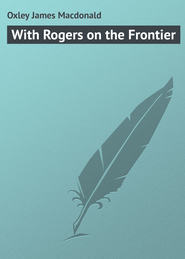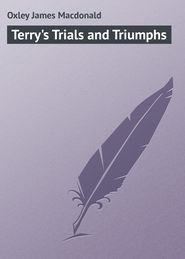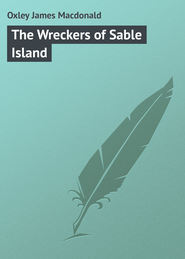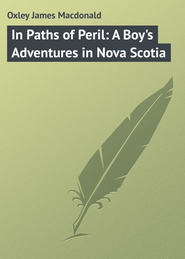По всем вопросам обращайтесь на: info@litportal.ru
(©) 2003-2024.
✖
Ti-Ti-Pu: A Boy of Red River
Настройки чтения
Размер шрифта
Высота строк
Поля
By this time, several of the inmates of the fort had gathered, curious as to what was up, and, had Mr. Macrae been alone, their sinister looks might well have made him anxious concerning his own safety.
But his only thought was for Hector, and the grave, sinewy men by his side, though few in numbers, were not the kind to invite hasty attack; so, paying no heed to threatening looks or menacing utterances, the little party reached the door of the fur-house.
Upon this, Mr. Macrae struck hard with his pistol-butt, calling out: 'Hector, laddie, are ye there?'
Instantly there came back from the interior a muffled cry of joy, and the faint words: 'Father! oh, father! is that you?'
There was a stout padlock fastening the door, but Mr. Macrae quickly prised this off, and tore the door open. Out of the interior darkness rushed Hector and flung himself, half-sobbing, into his father's arms.
Andrew returned the embrace warmly, and then asked in a tone of surprise and concern: 'Was no' Dandy with you?'
'Why no, father!' replied Hector. 'The man that shut me up took both Dour and Dandy away with him.'
'Then we maun find the dog,' was the resolute rejoinder. 'Here, Dour, gude dog, call Dandy.' Without a moment's hesitation, the well-trained creature poured forth a volley of barks that meant as plainly as possible, 'Dandy, where are you? Tell us.'
'Now listen, friends, for the answer,' said Mr. Macrae, with a grim smile.
There was no doubt about the response, for out of the surrounding gloom burst a chorus of canine music that fairly made the welkin ring, and how Dandy's particular contribution could be distinguished seemed a hopeless problem.
But Mr. Macrae waited silently until the commotion had somewhat subsided, and then, pointing to the northern end of the enclosure, said confidently: 'There's whaur they've got Dandy.'
Dour evidently approved of their going thither, and presently, turning the corner of one of the most remote buildings, they found the object of their search, half-strangled in his frantic efforts to break the thong that held him fast.
'God be thanked – we've found all three, and they're nane the waur of it,' said Mr. Macrae, in a tone of fervent gratitude; and then, his voice changing to righteous indignation, 'by the morn we'll find out why this was done to ma laddie, and who did it.'
With the morn, however, came strange and startling events, that caused Hector's peculiar experience to be entirely forgotten. To understand these aright, a little explanation is necessary. Although the great Hudson's Bay Company claimed full ownership of the North-West, their right to this vast wilderness was vigorously disputed by a company formed in Lower Canada and called the North-West Fur Company. The rivalry between the two companies for control of the fur-trade was intense and unscrupulous. They resorted to all sorts of stratagems to injure each other, and wherever one built a fort, the other soon established a second within sight. Often their employees, made wild with strong drink, broke out into open violence and many lives were lost, and a number of forts sacked and burned in the course of the bitter struggle.
Now, the Nor-Westers, as they were called for short, regarded the advent of the Scotch folk with lively animosity. They suspected it to be a shrewd device of their rivals to get a firmer grip upon the country. The new-comers would not be rovers like themselves, but settlers, who would build houses, and till the rich soil, and multiply in numbers until they became a power in the land.
This far-seeing scheme must be nipped in the bud, and forthwith they set themselves to do it.
The strange part of the whole affair was that they ran slight risk of interference with their nefarious design from their hated rivals, for the employees of the Hudson's Bay Company, although, of course, they would take no part against the immigrants, were little more in favour of their coming than the Nor-Westers. They did not want the country settled. They had much rather it should remain a hunters' paradise, and they were not disposed to lift a finger on behalf of the newcomers.
The first morning after the settlers' arrival seemed full of kindly promise. Summer was just giving way to autumn. The prairie air was clear and bracing without being too cool. The sun shone from an azure sky upon a vast expanse of golden-hued turf almost as level as a floor, that only required to be turned over by the plough to be ready for fall seeding.
The hardy Scotch folk, accustomed to the rocky uplands and stony meadows of their 'ain countree,' looked with wonder and delight at the rich inheritance into which they had come.
'Eh, mon! but it's grand, grand!' ejaculated Saunders Rowan, in a tone of unqualified appreciation. He was the senior member of the party, and had been rather given to 'croaking,' but this glorious morning his doubts and fears were all dispelled.
The women busied themselves preparing the morning meal, while the children and dogs romped and rolled joyously in the rich, soft grass. It was altogether a pretty picture, that seemed to be a happy augury of the good times in store.
Suddenly, like a bolt out of the blue, this scene of gladness and peace changed to one of terror and strife. With no more warning than if they had risen out of the ground itself, there charged down upon the defenceless settlers a band of Indians in full war paint, mounted upon their piebald ponies, armed with spears, bows, arrows, and guns, which weapons they brandished fiercely, while they gave their awful war-whoop with all the power of their lungs.
Crying to their children, and gathering them close, as the mother hen does her chickens at sight of a hawk, the women huddled together in a panic-stricken group, while the doughty dogs faced the enemy with flashing teeth and threatening growls, and the men rushed to snatch up their guns, or anything else that might serve as an effective weapon.
For a moment it seemed as if blood must be shed. The Indians seemed ripe for mischief and the stalwart Scots were determined to defend their dear ones to the last extremity.
But before a blow was struck, the band, at a signal from their leader, brought their horses to a halt, and ceased their hideous howlings. The leader then drew out from his mob of followers, and holding up his hands in token of his wish to parley, asked in broken English for the chief man of the strangers.
There was at first some hesitancy among the Scots at replying to this. They had never formally chosen a leader, although, naturally, some of the men had shown themselves stronger and shrewder than others. Presently all eyes turned towards Andrew Macrae. No man was fitter by appearance or sagacity to be their spokesman, and, in response to their unmistakable choice, he stepped forward.
'I'm but one of our little company, yet if ye'll tell me what ye mean by a' this claverin' and scarin' peaceable folk, I'm ready to talk wi' ye.'
The Indian leader straightened up in his saddle. The stern, stalwart Scotsman was no antagonist to be trifled with, and his first intention of using the ready wit for which he had a reputation, to bait the strangers for the amusement of his followers, before proceeding to rougher measures, underwent a change. Such a man needed to be dealt with in a different fashion. Accordingly, assuming as much dignity as he could command, he began to explain what the alarming demonstration meant.
His speech was a strange jargon compounded of English, French and Indian words that would have sorely puzzled poor Mr. Macrae, were it not helped out by a vigorous pantomime, that enabled him to follow the drift of it, after a fashion.
The purport was serious enough, and his normally grave countenance grew graver still as the meaning became clearer to him.
In brief, it was an order to quit! Having at last reached their haven, after so long and perilous a journey over sea and land, they were summarily commanded to depart, and that without delay.
CHAPTER VII
How Hector Got His Nickname
At first, Mr. Macrae refused to credit his own intelligence. The idea was too appalling, and in his slow, deliberate way he made the Indian leader repeat and reiterate his sinister communication.
Then, calling aside the seniors of his party, who had all been watching the parley with intent, anxious faces, he told them the startling truth.
Naturally enough, they likewise were at the outset incredulous, and stirred to righteous wrath. What had this howling mob of painted and befeathered Indians to do with them? They were not the lords of the land now, whatever they might have been before the coming of the white man. Lord Selkirk was the rightful owner of the broad, rich acres to which they had made so painful a pilgrimage, and they, the settlers, were the possessors in his name. Not one step would they budge. They had come to stay.
All this, and more, Mr. Macrae repeated to the Indian leader with the utmost emphasis, but he might as well have spared his breath.
'Non – no – non!' the fellow responded in his hybrid jargon. 'Must go way. No stay here. No food, no fire, no tepee. Go way down there,' and he pointed due south.
While this parley was proceeding, the other members of his party had been quietly forming a circle about the band of settlers, drawing steadily closer until they were almost within touch of them. As it happened, little Ailie, her first fright having passed off, grew interested in the gay trappings of the Indians, and, ere her mother noticed, sidled towards one of them, in order to touch the feathers that adorned his leggings.
She was just beside his stirrup, when, with a quick movement, he reached down, grasped her under the arms, and swung her up before him, saying, in what was meant to be a soothing tone:
'Ma jolie petite. You like ride – eh?' Ailie gave a scream of terror, that reached the ears of her mother and Hector at the same moment. The former stood transfixed, but Hector, whose position was somewhat behind the Indian, with the spring of a panther reached the pony's withers, and the next moment had the Indian's throat tightly clasped in his strong young hand.
The pony, frightened by the sudden addition of a second rider, at once began to buck and rear, so that even its expert owner could hardly retain his seat, doubly hampered as he was, holding Ailie, and being held by Hector.
Noting his predicament, his companions closed in upon him to give him help, and just at that moment Mrs. Macrae, her comely countenance aflame with maternal anger, darted into their midst, and reaching up, caught Ailie in her arms, crying: 'Ma bonnie bairn! Are ye hurt?' The Indian let go his burden readily enough, and turned to attack Hector.
But the latter was too quick for him. He had seen his mother's action, and the instant Ailie was safely in her arms, he let go of the Indian's throat, and threw himself to the ground, narrowly escaping being trampled upon by the ponies of the nearest Indians.
The whole thing happened so quickly that many of both parties saw nothing of it but the excitement it occasioned, and, for the moment, there was a complete break-up of the parley between Mr. Macrae and the Indian leader.
When order was in some measure restored, and Mr. Macrae had assured himself that neither of his children was in any wise injured, he once more gave attention to the serious situation which had so unexpectedly presented itself.
With considerable difficulty he made the Indian understand that he must have time to consider his astounding communication, and to consult with the other men of his party. To this the fellow, with much show of reluctance, at last consented, and a gruff command sent the whole cavalcade cantering off to a little distance, where they dismounted, and, squatting upon the turf in a sort of circle, proceeded to light their pipes, and talk in guttural tones of what had happened.
The Scots, that is to say the older men of the party, now gathered in a little knot, their countenances grown suddenly haggard, for they all realized that they were face to face with a crisis more menacing than anything they had previously encountered.
''Tis unco strange. I canna understand it at all,' said Mr. Macrae. 'Noo that we are come here after sae great trouble they say we canna bide, but maun gang away doon to the States, where we dinna want to be.'
'Let us gang ower to the fort there,' suggested Saunders, pointing to the Hudson's Bay fort, which stood on the bank of the river, about a quarter of a mile distant. 'Surely the Governor will take our pairt and winna let these savages have their way with us.' This suggestion met with instant approval, and three of the party, including Mr. Macrae, were appointed to carry it out.











